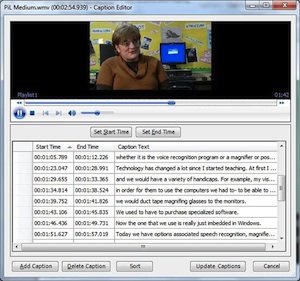Microsoft Steps Up Accessibility

Microsoft's STAMP software includes TTML import support and a basic caption editor for creating subtitles from scratch. |
Microsoft is giving a boost to accessibility in its Office 2010 suite and launching new training courses and resources dedicated to helping developers produce more accessible sites and software.
The company released two beta addons for Office 2010 Thursday, one for Word and one for PowerPoint. The PowerPoint addon, STAMP, is a subtitling tool that's used both to create captions within PowerPoint or to import existing TTML ("Timed Text Mark-up Language") caption files. It also includes a basic caption editor for creating, editing, and deleting captions within PowerPoint presentations. TTML import support includes formatting characteristics like color, alignment, and other styling elements. STAMP also allows users to turn captions on and off in presentation mode and to adjust the position of captions when the video changes size.
According to Microsoft, faculty members at Towson University in Maryland are using the software "to caption educational presentations that help the hearing disabled and others learn more efficiently."
Microsoft has also released an addon called Save as DAISY, which lets users save Open XML-format documents as DAISY XML and Full DAISY, either from single Open XML files or multiple files.
According to the company, "These formats include synchronized text and .MP3 audio that can be played directly within Windows 7 or DAISY XML, which works with compatible software readers and talking book/Braille reading devices."
Both of the new addons are available now in beta form.
The releases were announced at the International Technology and Persons with Disabilities Conference in an Diego and followed in the wake of recent accusations by the National Federation of the Blind against one of Microsoft's competitors, Google. That group issued a statement March 15 claiming that Google's Apps for Education, which competes with some of Microsoft's cloud offerings, falls short in the area of accessibility for blind users. The group also called on the United States Department of Justice to investigate four public school districts in Oregon and two universities--New York University and Northwestern University--that have adopted Google Apps for Education for possible "civil rights violations committed ... against blind faculty and students." The group said the apps in the suite contain "significant accessibility barriers for blind people utilizing screen access technology...."
Microsoft has also launched a collection of online resources, software, and courses to help developers make their sites and applications more accessible for users with disabilities. Called Microsoft Accessibility Tools & Training, the suite includes seven free training courses, for both technical and non-technical audiences, covering a range of technologies, including Web and desktop software.
According to the company, "Microsoft initially developed the online tools and training courses to increase accessibility awareness and expertise among its own developer groups. In response to growing customer demand for accessibility guidance, however, Microsoft decided to make the resources available, free of charge, to corporations, governments and nongovernmental organizations (NGOs) around the world that want to make technology more accessible."
Other resources available as part of the Microsoft Accessibility Tools & Training suite include a guide to tools for addressing accessibility issues for various kinds of disabilities, along with links for downloading most of the tools, and content tackling accessible rich Internet applications (ARIAs).
Further information about Microsoft Accessibility Tools & Training and the accessibility addons for Office 2010 can be found here.